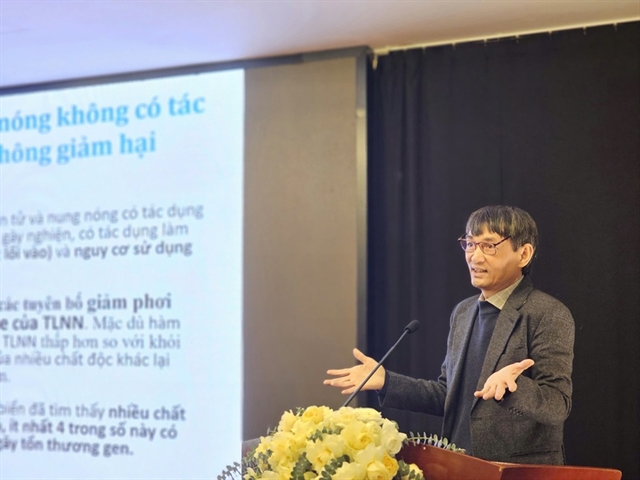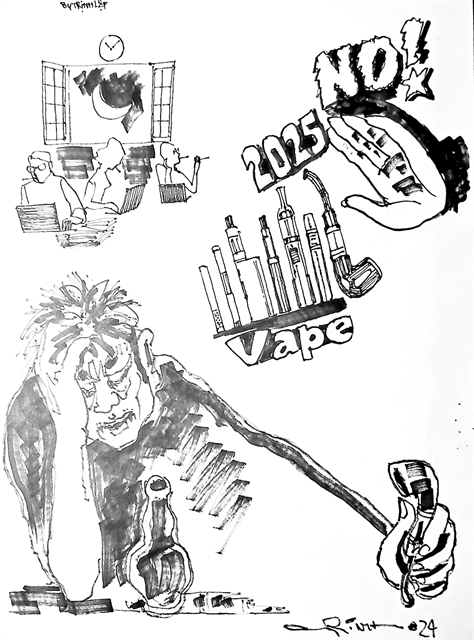 Society
Society

 |
| Illustration by Trịnh Lập |
By An Phương
Việt Nam will officially ban the production, trade, and use of e-cigarettes and heated tobacco products starting this year.
This groundbreaking decision is not only a significant step toward safeguarding public health but also a move toward fostering a healthier and more sustainable society.
In fact, this ban has garnered widespread support, especially among the youth.
“Despite being marketed as a safer alternative to traditional cigarettes, e-cigarettes still contain nicotine, a highly addictive substance,” 33-year-old Thanh Tâm, who works in the healthcare industry, told Việt Nam News.
The emergence of synthetic drugs being mixed into e-cigarettes has exacerbated the public health crisis.
Reports from nearly 700 healthcare facilities across Việt Nam in 2023, recorded 1,224 cases of hospital admissions linked to e-cigarettes and heated tobacco.
According to Dr Nguyễn Trung Nguyên, director of the Anti-Poison Department at Bạch Mai Hospital, e-cigarette poisoning cases have become alarmingly frequent, with nearly 100 cases admitted in the first half of 2024 alone.
Shockingly, tests on patient samples have uncovered synthetic drugs in many e-cigarette products, causing multi-organ failure, brain damage, and even death.
“These new drugs mutate continuously, making detection challenging. Some patients suffer permanent disabilities or cognitive impairment from using these products,” Nguyên said.
Tâm said: “The increasing frequency of such incidents signals a public health emergency that cannot be ignored.”
While e-cigarettes are a hidden and growing danger, the accessibility and affordability of e-cigarettes make them particularly appealing to teenagers and young adults.
“These products are often marketed as trendy, 'modern' lifestyle 'accessories', but they are driving a concerning trend,” Tâm said.
“My younger sister’s close friends frequently smoke e-cigarettes because they’re drawn to the variety of flavours. While the sweet-smelling vapors seem harmless, they actually pose serious health risks and encourage unhealthy habits.
“Unfortunately, my sister once confided in me that she felt ‘left out’ for not following her friends’ example.”
Honestly, I can deeply relate to Tâm’s younger sister’s experience, as I felt the same way years ago when I chose to refuse an e-cigarette in a social or public setting.
I often saw myself as “uncool”, and at just 18, this was a real challenge when trying to make new friends or strengthen bonds with existing friends.
The normalisation of smoking and vaping in media and on social platforms can downplay the dangers associated with these habits. Influencers, advertisements, and pop culture often glamorise smoking, leading young people to believe it is harmless or even fashionable.
At the recent session of Việt Nam’s National Assembly, Minister of Health Đào Hồng Lan confirmed her ministry’s consistent stance on banning e-cigarettes and heated tobacco products.
A former e-cigarette smoker, Anh Quốc, 34, said: “The ban was a wise and timely decision. I used to be an e-cigarette smoker but decided to quit as soon as I realised these products offer no proven health benefits compared to traditional cigarettes.”
Trọng Khánh, 25, who has been using e-cigarettes for three years, admitted that it might take him some time to completely quit e-smoking.
“To be honest, I’m not a fan of the new policy. However, I understand and respect the government’s commitment to public health and social well-being,” he said.
Đinh Thị Thu Thuỷ, deputy head of the legal department at the Ministry of Health, emphasised: “Banning these harmful products now will prevent a new wave of addiction, especially among children and teenagers. The sooner we act, the fewer lives will be endangered.”
An expert at the legal department at the Ministry of Health said: “Without classifying these products as banned, law enforcement becomes weak. Declaring them illegal provides a strong legal framework to prosecute offenders effectively.”
That being said, we all agreed that the fight against e-cigarettes is not limited to legislative measures.
Raising public awareness about the serious danger to health associated with these products remains of crucial importance.
“I occasionally talk with my younger sister about smoking, and I've realised that as long as I truly listen to her concerns and provide logical answers to any questions she might have, my 17-year-old sister is willing to listen and follow,” Tâm said.
"It is essential to address the negative influences, provide education on the risks, and offer accessible support systems to guide them toward healthier choices," she added.
We should all aim for a healthier Việt Nam, we all agreed. VNS




